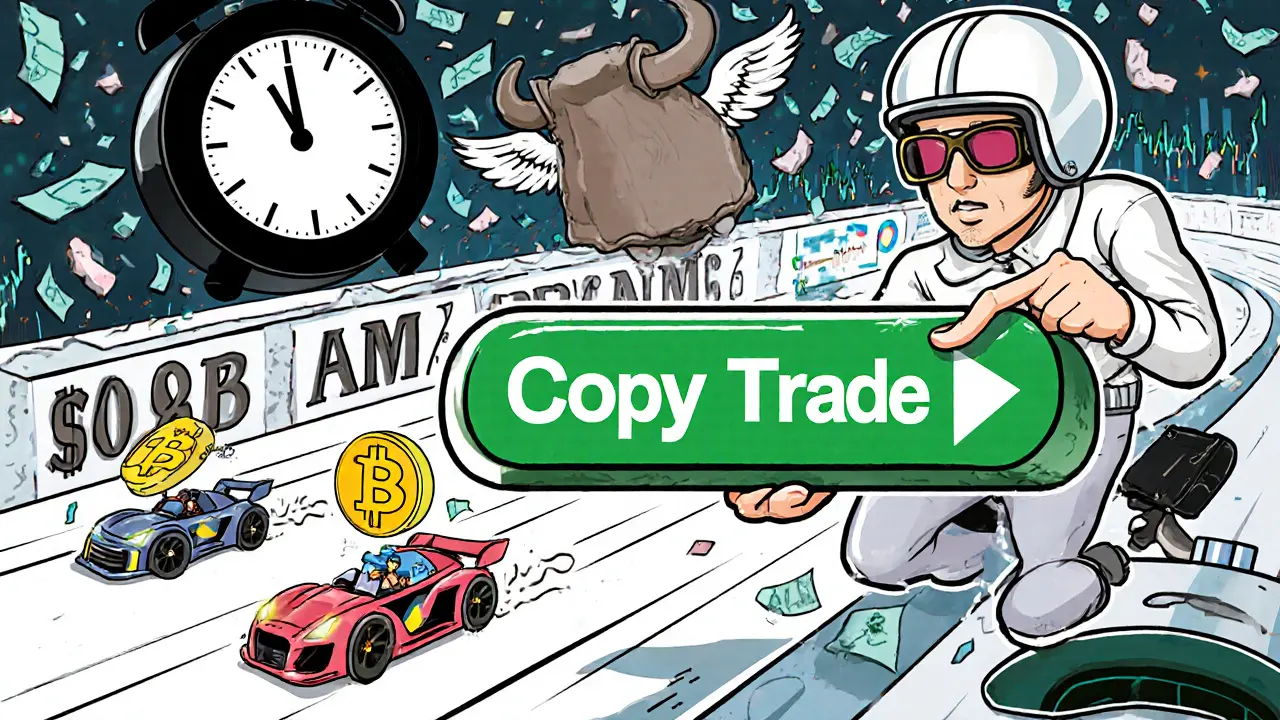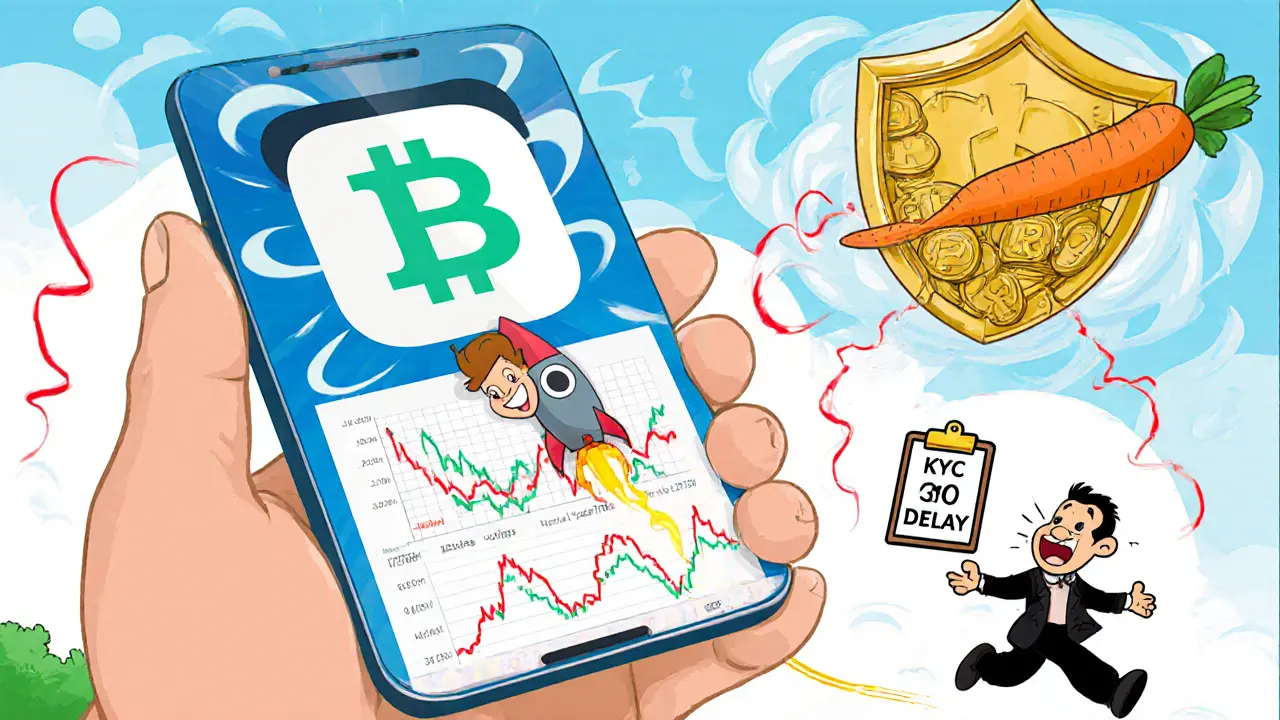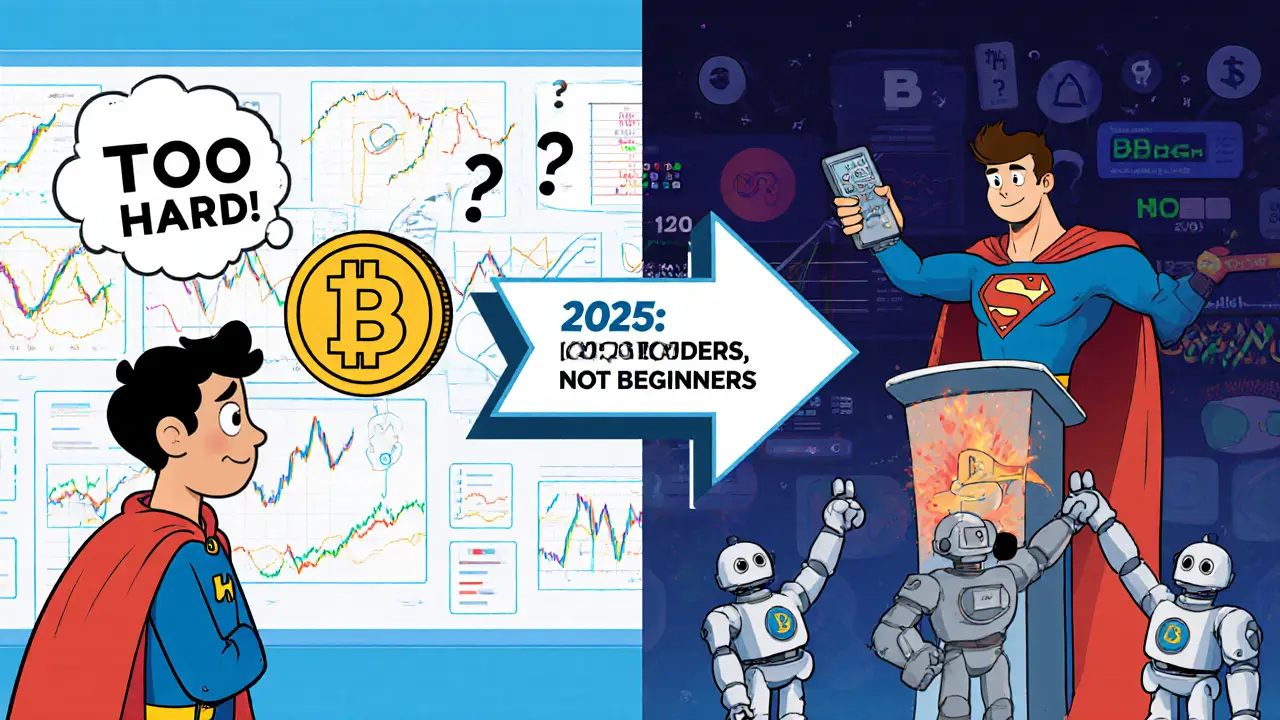Bitget Crypto Exchange Review 2025: Fees, Copy Trading, and Real User Experience
 Nov, 14 2025
Nov, 14 2025
Bitget Trading Fee Calculator
Calculate your exact Bitget trading fees based on your trading volume, VIP level, and whether you use the BGB token. Save hundreds of dollars per year with the right strategy.
Bitget Fee Structure
| VIP Level | Maker Fee | Taker Fee | Minimum Volume |
|---|---|---|---|
| Standard | 0.10% | 0.10% | 0 |
| VIP 1 | 0.095% | 0.095% | 250,000 |
| VIP 2 | 0.090% | 0.090% | 1,000,000 |
| VIP 3 | 0.085% | 0.085% | 2,500,000 |
| VIP 4 | 0.080% | 0.080% | 5,000,000 |
| VIP 5 | 0.075% | 0.075% | 10,000,000 |
| VIP 6 | 0.070% | 0.070% | 20,000,000 |
| VIP 7 | 0.065% | 0.065% | 50,000,000 |
| VIP 8 | 0.060% | 0.060% | 100,000,000 |
| VIP 9 | 0.020% | 0.060% | 2,000,000,000 |
Tip: Bitget's VIP 9 tier (requiring $2,000,000,000 in 30-day volume) offers the lowest maker fees at 0.02%—competitive with industry leaders. Using BGB token adds an additional 20% discount on top of VIP rates.
Is Bitget the right crypto exchange for you in 2025?
If you're trading crypto and looking for speed, low fees, and a mobile experience that doesn’t lag during market swings, Bitget might be worth your attention. Launched in 2018, Bitget has grown from a derivatives-focused platform into one of the top five crypto exchanges globally, with over 20 million users and $42.7 billion in daily derivatives volume as of October 2025. But it’s not for everyone. While it shines for intermediate traders who use copy trading or futures, beginners and those relying on easy bank deposits might hit roadblocks.
Bitget doesn’t hide its strengths: it’s built for traders who want to move fast, copy top performers, and keep costs low. But its weaknesses are just as clear-limited fiat options in key regions, slow KYC during spikes, and a learning curve that’s steeper than Binance or Kraken. So who should use it? Who should avoid it? Let’s break it down.
What Bitget actually offers: Spot, Futures, and Copy Trading
Bitget gives you three main ways to trade: spot, margin, and futures. You can buy and sell over 500 cryptocurrencies directly, use leverage up to 125x on select pairs, or trade perpetual futures with low fees. But the real standout? Copy trading.
Bitget’s copy trading system manages over $1.8 billion in assets under management (AUM), far ahead of Binance’s $620 million. You can browse top traders by performance, risk score, and strategy. Hit one button, and your account mirrors their trades in real time. No need to analyze charts or time entries. One user on Capterra reported their portfolio recovered from a 30% Bitcoin drop in July 2025 because they copied a trader who shorted at the right moment. That’s the kind of real-world result that matters.
For advanced traders, Bitget’s matching engine handles 100,000+ orders per second with an average execution speed of 1.2 milliseconds. That’s faster than most retail platforms. Charting tools are smooth, even during 10%+ price swings-87% of users in a CoinBureau survey reported zero lag. If you’re trading futures or swing trading, this isn’t just a nice-to-have. It’s essential.
Fees: One of the lowest in the industry
Trading fees on Bitget start at 0.10% for both makers and takers. That’s average for the industry. But here’s where it gets interesting: if you pay with BGB, Bitget’s native token, you get a 20% discount. That drops fees to 0.08% maker and 0.10% taker. For high-volume traders, this adds up fast.
At VIP 9 level (requiring $2,000,000,000 in 30-day trading volume), fees drop to 0.02% maker and 0.06% taker. That’s competitive with Binance’s lowest tier. Withdrawal fees vary by network. Bitcoin withdrawals cost 0.0005 BTC (~$35), while USDT on TRON is under $0.10. Network fees are clearly listed, so you won’t get surprises.
Compare that to Kraken’s 0.16% taker fee or Coinbase’s 0.6% for small trades. Bitget’s fee structure favors active traders. If you’re doing 10+ trades a week, saving even 0.02% per trade means hundreds of dollars a year.
Security: A $780 million safety net
Security is where Bitget impresses most. The exchange holds 95% of user funds in cold storage. It uses two-factor authentication, withdrawal address whitelisting, and real-time transaction monitoring. But the real differentiator? The $780 million Protection Fund.
That fund, verified in their July 2025 report, covers losses from hacks or system failures. It’s up from $300 million in early 2024. Bitget’s Proof of Reserves shows an 188% reserve ratio-meaning they hold more assets than users have deposited. Bitcoin advocate Michael Saylor called it “industry-leading transparency” during a September 2025 keynote.
That doesn’t mean it’s risk-free. Lex Sokolin of Consensys warned in a Financial Times op-ed that Bitget’s global expansion into 100+ countries creates regulatory gray zones. If a country cracks down, your funds could be frozen-even if the exchange itself is secure. That’s not a flaw in their tech. It’s a geopolitical risk.

Mobile app: Built for traders on the go
Bitget’s mobile app scores 4.6/5 on TradingView from over 6,800 reviews. Users consistently praise its smoothness. Unlike other apps that freeze during volatility, Bitget’s charts stay responsive. Android users need 8.0+, iOS users need 13+. It’s lightweight, fast, and works even on older phones.
The interface is clean. You can switch between spot, futures, and copy trading with one tap. The copy trading dashboard shows real-time performance stats, risk levels, and follower counts. You can pause or adjust your copied trades anytime. For traders who can’t sit at a desk all day, this is one of the best mobile experiences in crypto.
Fiat on-ramps: The big limitation
Here’s where Bitget falls short. While it supports 30+ fiat currencies via P2P, direct bank integrations are limited to just 15 countries. You can deposit USD, EUR, or GBP through bank transfer-but only if you’re in the U.S., Canada, Australia, or parts of Europe. Users in Latin America, Africa, and Southeast Asia often rely on P2P, which can be slower and less liquid.
Compare that to Binance, which supports 40+ direct banking options, or Kraken with 25+. In Nigeria and Vietnam, P2P liquidity dropped 30% in early 2025 due to local regulations. That means you might struggle to buy crypto quickly when prices move. If you need fast, reliable fiat deposits, Bitget isn’t your best bet.
Customer support and learning resources
Live chat is fast-78% of issues are resolved in under 8 minutes. Email takes 14.5 hours on average. That’s typical for crypto exchanges, but not ideal if you’re stuck during a trade.
Bitget’s Academy has 1,200+ minutes of video tutorials. The “Advanced Trading 101” course has an 82% completion rate. But the content assumes some prior knowledge. Beginners won’t find hand-holding like they would on Coinbase or Kraken. There’s no “what is a limit order?” level content.
API documentation is sparse. If you’re building bots or automated strategies, you’ll need to dig into community forums or third-party guides. The official docs are more like a quick reference than a full manual.

Who should use Bitget?
Bitget is perfect if:
- You trade futures or use leverage regularly
- You want to copy top traders without analyzing charts
- You’re on mobile and need a smooth, lag-free experience
- You pay with BGB and want the lowest possible fees
- You’re in Asia, Europe, or North America with access to bank deposits
Avoid Bitget if:
- You need to deposit fiat from Nigeria, Brazil, or South Africa
- You’re a complete beginner and need step-by-step education
- You’re an institutional trader needing OTC desks
- You want deep liquidity for large trades without slippage
How it stacks up against competitors
Here’s how Bitget compares to top rivals as of October 2025:
| Feature | Bitget | Binance | Bybit | OKX |
|---|---|---|---|---|
| 24h Derivatives Volume | $42.7B | $85.3B | $58.1B | $49.6B |
| Copy Trading AUM | $1.8B | $620M | $410M | $320M |
| Max Leverage | 125x | 125x | 125x | 100x |
| Fiat On-Ramps | 15 banks | 40+ banks | 20 banks | 25 banks |
| Mobile Rating | 4.6/5 | 4.4/5 | 4.3/5 | 4.2/5 |
| BGB Token Discount | 20% off fees | 25% off with BNB | 15% off with BYBIT | 10% off with OKB |
Bitget doesn’t lead in volume, but it leads in copy trading. It’s not the easiest for beginners, but it’s the most reliable for active traders who want speed and automation.
What’s next for Bitget?
Bitget is pushing hard in 2025-2026. In October, they launched GetAgent 2.0-an AI tool that generates trading strategies with 92% backtested accuracy. They added 12 new blockchains, including Monad and Berachain. By Q2 2026, they plan to launch an institutional OTC desk and integrate a DEX aggregator into Bitget Wallet.
Analysts predict Bitget could climb to #3 in derivatives volume by late 2026. But growth comes with risk. 63% of their operations are in countries with unstable crypto regulations. If Southeast Asia or Latin America cracks down hard, user growth could stall.
Still, with a $780 million safety net and a user base that’s growing 12.7% quarterly, Bitget isn’t going away. It’s a powerful tool for the right trader.
Is Bitget safe to use in 2025?
Yes, Bitget is one of the safer exchanges for active traders. It holds 95% of assets in cold storage, uses multi-factor authentication, and maintains a $780 million Protection Fund backed by real-time audits. Its reserve ratio of 188% means it holds more than it owes users. However, because it operates in over 100 countries with varying regulations, your funds could be affected by local government actions-even if the exchange itself is secure.
Can I deposit fiat directly into Bitget?
You can deposit fiat directly only if you’re in one of the 15 countries with bank integrations, like the U.S., Canada, Australia, or parts of Europe. For users in Nigeria, Brazil, Vietnam, or other regions, you’ll need to use P2P trading. P2P is available but can be slower and less liquid, especially after recent regulatory changes in some markets.
Is copy trading on Bitget reliable?
Yes, copy trading on Bitget is reliable and the best in the industry. It manages $1.8 billion in assets under management, far more than Binance or Bybit. Trades execute in real time with minimal delay. Users report successful outcomes during volatile markets, like copying a trader who shorted Bitcoin during a 30% drop in July 2025. Always check a trader’s risk score and history before copying.
What are Bitget’s trading fees?
Standard fees are 0.10% maker and 0.10% taker. If you pay with BGB, Bitget’s native token, you get a 20% discount-bringing fees to 0.08% maker and 0.10% taker. High-volume traders at VIP 9 level pay as low as 0.02% maker and 0.06% taker. Withdrawal fees vary by blockchain, with Bitcoin costing around $35 per withdrawal.
Is Bitget good for beginners?
Bitget is not ideal for complete beginners. It lacks beginner-friendly tutorials and educational content. The interface assumes you know what leverage, futures, and margin mean. While the mobile app is easy to use, the learning curve is steeper than Binance or Coinbase. Beginners should start with simpler platforms and return to Bitget once they understand basic trading concepts.
How fast is Bitget’s customer support?
Live chat is fast-78% of issues are resolved within 8 minutes. Email support takes an average of 14.5 hours. KYC verification can take up to 48 hours during high-volume periods like market crashes. Support quality is good for urgent issues but slow for paperwork-heavy requests.
Does Bitget have a desktop app?
Bitget doesn’t have a dedicated desktop app, but its web platform works perfectly on Chrome, Firefox, and Safari. The interface is fully responsive and supports advanced charting tools. Most users prefer the mobile app for convenience, but the web version is just as powerful for desktop trading.
Final verdict: A powerful tool for the right trader
Bitget isn’t the easiest crypto exchange to use, but it’s one of the most powerful for those who know what they’re doing. If you’re copying traders, trading futures, or moving quickly on mobile, it’s hard to beat. The fees are low, the security is strong, and the copy trading feature is unmatched.
But if you’re new to crypto, need to deposit cash from a local bank in Latin America or Africa, or want hand-holding through every step-you’ll be frustrated. Bitget doesn’t cater to beginners. It caters to traders who want speed, control, and automation.
In 2025, Bitget isn’t trying to be everything to everyone. It’s doubling down on what it does best. And for intermediate to advanced traders, that’s more than enough.
Vanshika Bahiya
November 14, 2025 AT 08:27Albert Melkonian
November 16, 2025 AT 03:35Byron Kelleher
November 16, 2025 AT 17:14Anthony Forsythe
November 17, 2025 AT 05:58Kandice Dondona
November 18, 2025 AT 22:53Becky Shea Cafouros
November 20, 2025 AT 13:36Drew Monrad
November 21, 2025 AT 16:25Cody Leach
November 21, 2025 AT 19:10Mandy Hunt
November 23, 2025 AT 04:26anthony silva
November 23, 2025 AT 09:26David Cameron
November 24, 2025 AT 12:35Sara Lindsey
November 25, 2025 AT 07:43alex piner
November 26, 2025 AT 18:11dhirendra pratap singh
November 28, 2025 AT 03:36Ashley Mona
November 28, 2025 AT 11:48Gavin Jones
November 30, 2025 AT 10:57Mauricio Picirillo
November 30, 2025 AT 16:07